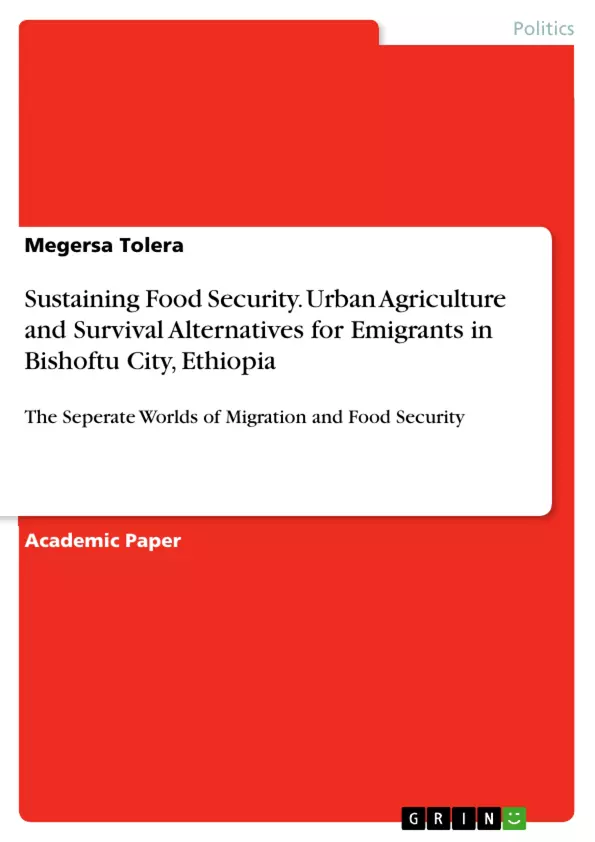This paper devotes to discuss the concept of sustaining food security and urban agriculture and survival alternatives for migrants, as well as factors that help initiate the process and addresses possible reasons for the disconnect and then presents and discusses the implications for linking migration and food security. This paper therefore seeks to initiate a conversation between the separate worlds of migration and development on the one side, and food security on the other.
The issue of food security is strikingly absent from current debates about the relationship between migration and development. The current international food security agenda displays a similar disregard for migration. There appears to be a massive disconnect between these two global development agendas. The reasons are hard to understand since the connections between migration and food security seem obvious.
The methodology consisted of two data collection techniques: questionnaire survey and in-depth, semi-structured case-study interviews. These two data collection methods complement each other by providing generalized information through the survey and more fine-grained information through the in-depth interviews. The study used 58 representatives (sample). The results show a consistent pattern of difference between urban migrant and non-migrant households in relation to levels of food insecurity, sources of income, food procurement strategies, and participation in urban agriculture.
Inhaltsverzeichnis (Table of Contents)
- Abstract
- Introduction
- Literature review and key concepts
- Methodology
- Research Findings
- References
Zielsetzung und Themenschwerpunkte (Objectives and Key Themes)
This paper explores the complex relationship between migration, food security, and urban agriculture in Bishoftu, Ethiopia, focusing specifically on the experiences of migrants. It aims to bridge the gap between existing development agendas and highlight the crucial link between migration and food security.
- The impact of rural-urban migration on food security in urban areas.
- The role of urban agriculture as a survival strategy for migrants.
- The challenges and opportunities of linking migration and food security development agendas.
- The impact of urbanization and industrialization on food security.
- The role of the informal economy in mitigating food insecurity among migrants.
Zusammenfassung der Kapitel (Chapter Summaries)
The introduction provides an overview of the context and significance of the research, highlighting the growing urban population in Bishoftu and the associated challenges to food security. The literature review delves into key concepts and existing research on migration, food security, and urban agriculture. The methodology section outlines the research design, data collection techniques, and sample size. The research findings chapter presents the results of the study, highlighting the relationship between migration, food security, and urban agriculture in Bishoftu.
Schlüsselwörter (Keywords)
Migration, food security, urban agriculture, urban poverty, informal economy, Bishoftu, Ethiopia.
Frequently Asked Questions
How does migration affect food security in Bishoftu?
Rural-urban migration often leads to increased levels of food insecurity among migrants due to limited income sources and higher costs of food procurement in the city.
What is the role of urban agriculture for migrants?
Urban agriculture serves as a vital survival strategy, allowing migrant households to produce their own food and supplement their income.
Why is there a disconnect between migration and development agendas?
Current debates often separate migration from food security, failing to recognize that migration is frequently a direct response to food insecurity in rural areas.
What are common food procurement strategies for urban migrants?
Migrants rely on a mix of informal markets, urban farming, and social networks to obtain food when formal income is insufficient.
How does urbanization impact food security in Ethiopia?
Rapid urbanization and industrialization can displace agricultural land and increase the demand for food, putting pressure on vulnerable populations like new migrants.
- Citar trabajo
- Megersa Tolera (Autor), 2019, Sustaining Food Security. Urban Agriculture and Survival Alternatives for Emigrants in Bishoftu City, Ethiopia, Múnich, GRIN Verlag, https://www.grin.com/document/476897



